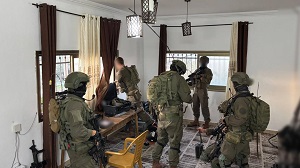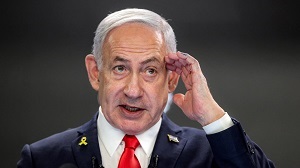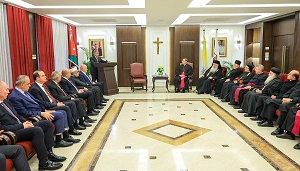William Burns Is Biden’s Choice for C.I.A. Director

The New York Times
WASHINGTON — President-elect Joseph R. Biden has selected William J. Burns, a career State Department official who led the U.S. delegation in secret talks with Iran, to run the C.I.A.
In selecting Mr. Burns, Mr. Biden is turning to an experienced diplomat with whom he has a long relationship. The two men have worked together on foreign policy issues, not just during the Obama administration, but also while Mr. Biden led the Senate Foreign Relations Committee.
Mr. Biden said Mr. Burns’ first task would be to make sure that intelligence collection and analysis was not influenced by politics after years of President Trump’s attacks on the intelligence agencies.
In a statement early Monday, the president-elect said that Mr. Burns, 64, “shares my profound belief that intelligence must be apolitical and that the dedicated intelligence professionals serving our nation deserve our gratitude and respect.”
Mr. Biden has told his national security advisers that he wants to ensure that the C.I.A. is collecting, analyzing and providing intelligence without political spin, former officials said. Mr. Burns has a reputation for nonpartisanship and has held key diplomatic posts in both Democratic and Republican administrations, experience that should make his confirmation by the Senate relatively straightforward.
Under Mr. Trump there have long been allegations that intelligence has been politicized.His directors of national intelligence have taken on a partisan edge that has enveloped all of the intelligence agencies in controversy. (Although the C.I.A. is nominally overseen by the director of national intelligence, the agency operates with a large degree of autonomy.)
Mr. Burns has worked with C.I.A. officers throughout his career, though his experience is as a consumer of intelligence, not as a producer.
But former agency officials have asserted the most important quality in a director is not expertise in intelligence, but a relationship with the president and his top national security team, which Mr. Burns has. He and Mr. Biden’s national security adviser, Jake Sullivan, worked together on the Iran nuclear deal.
“He will have the ear of the national security advisor and the president. That’s what you want in a director,” said Jeremy Bash, who served as a senior intelligence official in the Obama administration.
John O. Brennan, the former C.I.A. director in the Obama administration, noted that Mr. Burns has long experience working with the agency during his ambassadorial postings and senior State Department posts. Mr. Brennan recounted how he and Mr. Burns gave a classified briefing to the Senate Intelligence Committee on a C.I.A. covert action program.
“He has deep substantive expertise, a wealth of experience working with C.I.A., and he understands the intelligence mission very well,” Mr. Brennan said.
The pick of Mr. Burns suggests that Mr. Biden is putting an emphasis on traditional national security threats. Mr. Burns has long experience with Iran and Russia.
He was instrumental in starting the secret talks with Tehran in the Obama administration, which ultimately resulted in the agreement in which Iran agreed to give up its nuclear program in exchange for relief from punishing sanctions on its economy by six world powers, including the United States. Mr. Trump withdrew from the nuclear deal in 2018, and Mr. Burns could prove critical in aiding the administration in restarting discussions with Tehran.
Mr. Burns sensed an opening to Iran in 2013, with the landslide election of Hassan Rouhani as president. He teamed up with Mr. Sullivan to meet with key Iranians to scope out the parameters of a possible deal. That mission was successful, though it took two more years to negotiate the deal.
Mr. Burns also served as ambassador to Russia from 2005 to 2008, making him a keen observer of President Vladimir V. Putin. Russian interference in American elections has been one of the most important intelligence issues in recent years.
In all, Mr. Burns did two tours in Moscow and speaks Russian, deep knowledge that will serve him well in the new role, colleagues said.
“He’s really excelled as an intellect, as a strategist and as an analyst,” said Nicholas Burns, a former senior diplomat and Mr. Burns’ predecessor as the State Department’s under secretary of state for political affairs. “He has demonstrated very strong analytical skills and incisive understanding of our adversary, Russia.”
Members of Mr. Biden’s intelligence transition team have discussed the importance of expanding the intelligence community’s work on foreign interference, beyond election influence. Some members of Mr. Biden’s team also believe the government must do more to examine how foreign powers may be trying to provide support or influence extremist groups.
Mr. Burns, currently the president of the Carnegie Endowment for International Peace, has been vocal in his belief that American diplomacy has been damaged in the Trump administration.
He has the mind of the diplomat, seeking to figure out how to give adversaries some political breathing room to make an agreement.
He speaks and writes broadly — he published an autobiography that is considered by many to be a guidebook to post-Cold War diplomacy in the United States, and that will now be restudied around the world for insights into his thinking.
Described as a “steady hand” and “very effective firefighter” by former secretary of state Hillary Clinton, Mr. Burns spent 32 years at the State Department, before retiring in 2014. In addition to his posts in Moscow, he was the American ambassador in Jordan and held several high-level leadership positions in Washington.
Mr. Burns has also played a role in the State Department’s most prominent, and painful, moments over the past two decades.
In 2012, he accompanied the bodies of Ambassador J. Christopher Stevens and three other Americans on a C-17 flight from Ramstein Air Base in Germany to Washington after the attack on the American compound in Benghazi, Libya.
In 2002, Mr. Burns wrote a memo that has become known as the “Perfect Storm” memo that highlighted the dangers of American intervention in Iraq.
There will be a measure of diplomacy in the C.I.A. role, as the new director sets out to rebuild relationships with allies.
“Bill will bring fresh leadership to a C.I.A. that has been marginalized during the Trump years,” said John Sawers, the former head of Britain’s foreign intelligence service, MI-6.
For a time Michael J. Morell, a former deputy director of the agency, was considered the leading candidate for the C.I.A. post. But some Democratic senators voiced public and private reservations. Senate Ron Wyden of Oregon, opposed the nomination, accusing Mr. Morell of defending torture, a charge he denied.
After the announcement of Mr. Burns’ nomination, Mr. Wyden said in a a statement that he was “a strong choice” for the post. Mr. Burns, Mr. Wyden said, has “the judgment to recognize we can protect our people without compromising the values that make America special.”
A key question will be how Mr. Burns works with Avril D. Haines, Mr. Biden’s choice to lead the Office of the Director of National Intelligence. The Biden transition team has said Ms. Haines will be the senior intelligence official in the administration. In past administrations, there have often been tensions between the director of national intelligence and the C.I.A. director.
But Ms. Haines and Mr. Burns worked together for a long time, stretching back to time she spent at the State Department. Temperamentally, the two should have little friction, Mr. Brennan said.
“One of the things the two of them share is that neither of them have an ego,” Mr. Brennan said. “So they’re not going to be trying to elbow each other out of the way.”
Latest News
-
 ‘Israel’ launches major military operation in Jenin
‘Israel’ launches major military operation in Jenin
-
 ‘Israel’ recognizes Somaliland as sovereign state
‘Israel’ recognizes Somaliland as sovereign state
-
 Deputising for King, interior minister attends midnight Christmas mass in Bethlehem
Deputising for King, interior minister attends midnight Christmas mass in Bethlehem
-
 King, Crown Prince extend their Christmas greetings, New Year wishes
King, Crown Prince extend their Christmas greetings, New Year wishes
-
 Prime minister extends Christmas, New Year greetings to Christian community
Prime minister extends Christmas, New Year greetings to Christian community